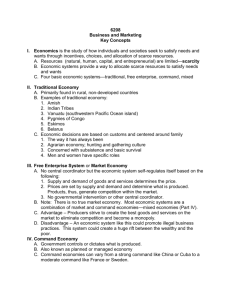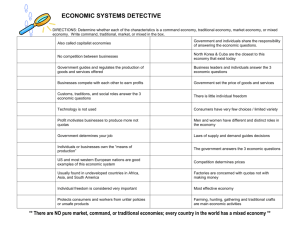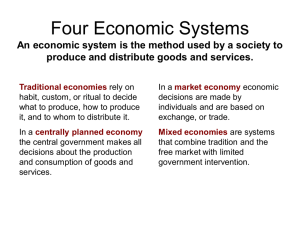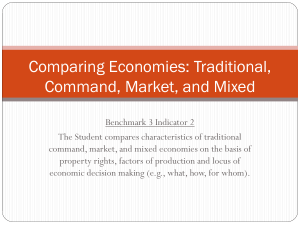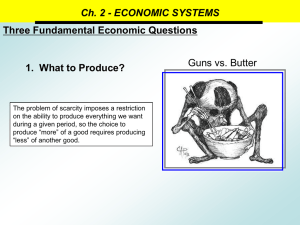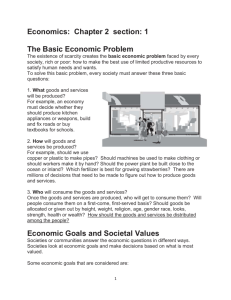Economic Systems Homework
advertisement
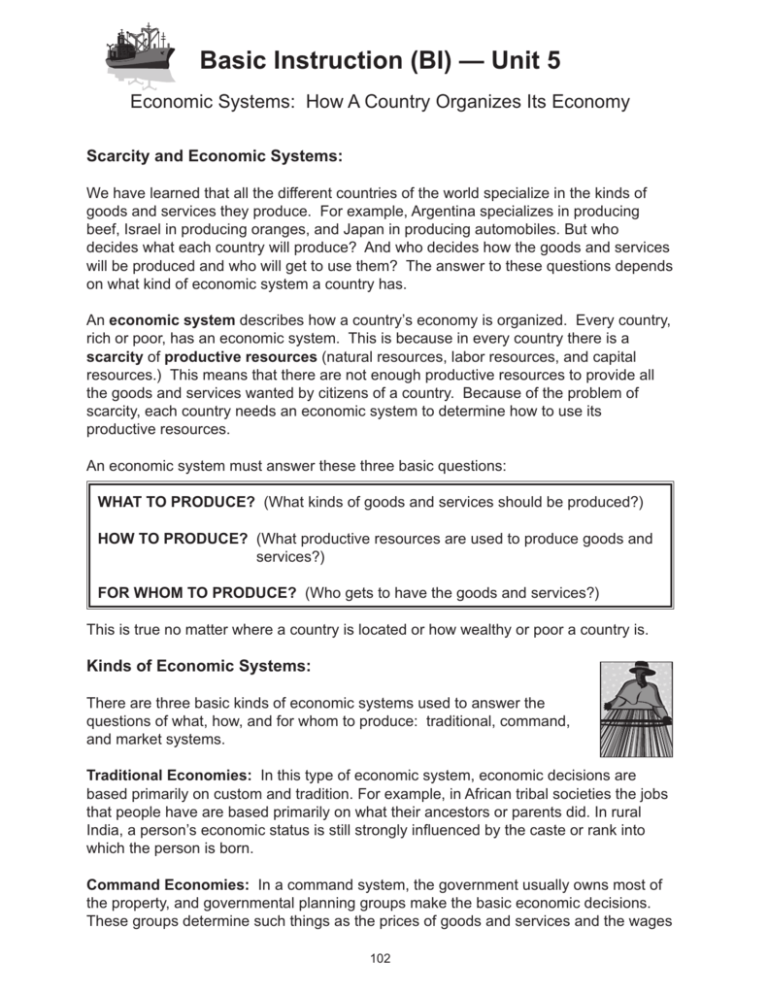
Basic Instruction (BI) — Unit 5 Economic Systems: How A Country Organizes Its Economy Scarcity and Economic Systems: We have learned that all the different countries of the world specialize in the kinds of goods and services they produce. For example, Argentina specializes in producing beef, Israel in producing oranges, and Japan in producing automobiles. But who decides what each country will produce? And who decides how the goods and services will be produced and who will get to use them? The answer to these questions depends on what kind of economic system a country has. An economic system describes how a country’s economy is organized. Every country, rich or poor, has an economic system. This is because in every country there is a scarcity of productive resources (natural resources, labor resources, and capital resources.) This means that there are not enough productive resources to provide all the goods and services wanted by citizens of a country. Because of the problem of scarcity, each country needs an economic system to determine how to use its productive resources. An economic system must answer these three basic questions: WHAT TO PRODUCE? (What kinds of goods and services should be produced?) HOW TO PRODUCE? (What productive resources are used to produce goods and services?) FOR WHOM TO PRODUCE? (Who gets to have the goods and services?) This is true no matter where a country is located or how wealthy or poor a country is. Kinds of Economic Systems: There are three basic kinds of economic systems used to answer the questions of what, how, and for whom to produce: traditional, command, and market systems. Traditional Economies: In this type of economic system, economic decisions are based primarily on custom and tradition. For example, in African tribal societies the jobs that people have are based primarily on what their ancestors or parents did. In rural India, a person’s economic status is still strongly influenced by the caste or rank into which the person is born. Command Economies: In a command system, the government usually owns most of the property, and governmental planning groups make the basic economic decisions. These groups determine such things as the prices of goods and services and the wages 102 of workers. This kind of economic system has not been very successful, and fewer and fewer countries are relying on it. Poland is an example of a country which has abandoned a command economy. Cuba and North Korea still have command economies, but Cuba is beginning to change. Market Economies: There are several different names for a market system, including capitalism, laissez-faire, and free enterprise. In a market system, most of the resources are owned by private citizens. Citizens can own their own businesses and can keep the profits they earn from them. The important economic questions are not answered by the government, but by individuals themselves as they take part in the economy. For example, the government does not tell people what job they must do. Instead, people have the freedom to make that choice themselves. Likewise, the government does not tell a business what products it must produce and what price it must charge. When individuals make decisions in a market system, they are guided primarily by changing prices. For example, suppose the wage rate for skilled automobile mechanics is very high, say $45 per hour! This high wage indicates that skilled mechanics are in great demand relative to their supply. The high wage provides a strong incentive for individuals to get the training necessary to become a mechanic. Likewise, if a high price for strawberries results in high profits for strawberry growers, this would encourage producers to grow more strawberries. The key idea is that it is the price that guides workers, businesses, and consumers, not the government. Social Goals and Economic Systems The economic decisions of individuals and governments reflect broad social goals. Economists have identified several of these goals: • Freedom the liberty of action individuals have to make economic decisions, such as what work to pursue and what goods and services to consume • Efficiency using the least costly methods to produce goods and services; making sure we get the most out of a given amount of productive resources • Growth the long term increase in the quantity of goods and services available to individuals • Security protection against economic risks such as inflation, unemployment, and poverty • Equity the issue of “fairness” in the marketplace and in the distribution of income • Environmental concern for a country’s environment and natural resources Quality 103 Sometimes these goals work against each other. For example, in a command economy, the government may assign everyone a job, but the jobs may be very boring and inefficient. In this case, there may be job security, but growth, freedom, and efficiency suffer. Another example is environmental protection. Laws which protect the environment restrict the freedom of businesses and may hinder growth. In situations where goals work against each other, final economic policies usually involve trade-offs. For example, if environmental laws are passed which limit oil exploration in some wilderness areas, the society is trading off the benefits of more oil for a more beautiful and pristine environment. In this case, the society accepts less efficiency, freedom, and growth, but gains more environmental quality. Which Economic System Is Best? Individuals differ on the answer to this question. However, economics systems that emphasize the market approach certainly have proven to be best in promoting the goals of growth, efficiency, and freedom. This is because in a market system citizens are free to own their own property and use it in the most efficient and profitable way. Command and traditional systems sometimes offer more security, but are not nearly so strong in efficiency, growth, freedom, and environmental quality. KEY POINTS TO REMEMBER 1. Every economy must answer these three basic questions: What to Produce? How to produce it? And For Whom to produce? The way an economy answers these questions determines its economic system. 2. The three basic types of economic systems are traditional economies, command economies, and market economies. 3. No country has a pure economic system. To some extent, all economies are mixed economies, but most are closer to one type of economic system than another. KEY TERMS TO REMEMBER Command Economy — an economic system in which a central, governmental authority decides how to use a country’s scarce productive resources Economic Systems — economic systems describe how countries make decisions about how to use scarce productive resources Market — anywhere buyers and sellers exchange goods and services Market Economy — an economic system in which individuals own and decide what to do with scarce productive resources. Prices guide economic decisions Trade-Off — getting less of one thing in order to get more of something else Traditional Economy — an economic system in which economic decisions are made largely by custom and historical precedent 104 Questions To Master 1. Explain why every country must have an economic system. ___________________________________________________________________ ___________________________________________________________________ 2. What are the three basic economic questions that every country must answer? ___________________________________________________________________ 3. What are the three basic kinds of economic systems? ___________________________________________________________________ 4. The former Soviet Union was an example of what kind of economic system? ___________________________________________________________________ 5. Which kind of economic system is best for raising a country’s standard of living? ___________________________________________________________________ 6. Which economic system is characterized by the least change? ___________________________________________________________________ 7. Which economic system allows for the most individual freedom? ___________________________________________________________________ 8. In which economic system is the government most influential? ___________________________________________________________________ 9. In the market system, what factor guides economic activity? ___________________________________________________________________ 10. In which economic system do individuals make decisions based on how things have always been done? ___________________________________________________________________ 11. List five economic/social goals that countries use to guide individual and government decisions. ___________________________________________________________________ ___________________________________________________________________ 105
